Swimming World Championships 2023: Aussies’ stay in Fukuoka ends in style
Australia have added three individual medals on the final night of the Swimming World Championships, as the ‘best swim team on the planet’ ended their stay in Fukuoka in style.

Swimming
Don't miss out on the headlines from Swimming. Followed categories will be added to My News.
Australia’s most successful swim team has closed out the world championships in Fukuoka, Japan in style, finishing top of the medals table with a record haul that may never be beaten.
After eight days of intense competition, the Dolphins proved themselves to be the best swim team on the planet - collecting 13 gold, seven silver and five bronze medals for a staggering total of 25.
It’s only the second time the Dolphins have finished at the top of the medals table at the world titles - the previous occasion was also at Fukuoka in 2001 when Ian Thorpe was leading the team.
The current Dolphins equalled their record gold medal tally of 13 but set a new mark for total medals.
Fittingly, it was teenage sensation Mollie O’Callaghan who brought the Aussies home in the final event of the championships for a silver in the women’s 4x100 medley relay.

Just 19, O’Callaghan won six medals in total - five of them gold - and she was involved in four of the five world records the Australians set over the week.
Emma McKeon, swimming the butterfly leg in the relay, won her 10th lifetime world championship medal, breaking Grant Hackett’s long-standing Australian record of 19.
Kaylee McKeown swam the backstroke leg, collecting her second relay medal after winning three individual golds.
Kyle Chamers anchored Australia to a bronze medal in the men's medley relay- ensuring Australia has automatic places in each of the seven relays at next year’s Paris Olympics.
The Aussies also won three individual medals on the last night.
Shayna Jack won silver in the women’s 50m freestyle final, giving her a first individual medal at the world championships after she had won 10 in relays.
Sam Short won a bronze medal in the men’s 1500m freestyle, enhancing his reputation as Australia’s next great long-distance swimmer.
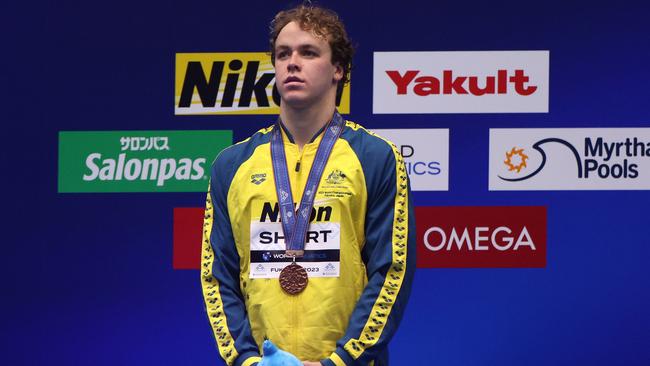
Short became the first Australian since Grant Hackett in 2005 to win medals in 400m, 800m and 1500m at the same world championships while leapfrogging Kieren Perkins and Mack Horton onto second place in the Australian rankings for the longest event in the pool.
Jenna Forrester became the first Aussie in over a decade to win a medal in the women’s 400m individual medley when she fought her way to third behind Canadian teenage sensation Summer McIntosh.
AUSSIES RACK UP MEDALS ON FINAL NIGHT OF WORLD CHAMPS
10:15PM BRONZE MEDAL FOR JENNA FORRESTER
Australia’s Jenna Forrester has broken a decade-long drought to win a bronze medal in Fukuoka.
Forreste finished third in the women’s 400m individual medley, won by Canadian teenage sensation Summer McIntosh.
Forrester became the first Aussie woman to win a medal at the world championships in the 400 medley since Stephanie Rice in 2011.

10:10PM SILVER LINING FOR SHAYNA
Shayna Jack has won her first ever individual medal at the world championships with a stunning performance in Japan.
Banned from competition for two years for a doping violation she maintains she was innocent of, Jack’s redemption is one of the feel-good stories of an Australian team overflowing with winners.
The ultimate team player, Jack had already won 10 world championship medals in relays for Australia but this was her first in a solo event. She won the silver in the women’s 50m freestyle final, finishing just behind Swedish world record holder Sarah Sjoestrom in 24.10 seconds.
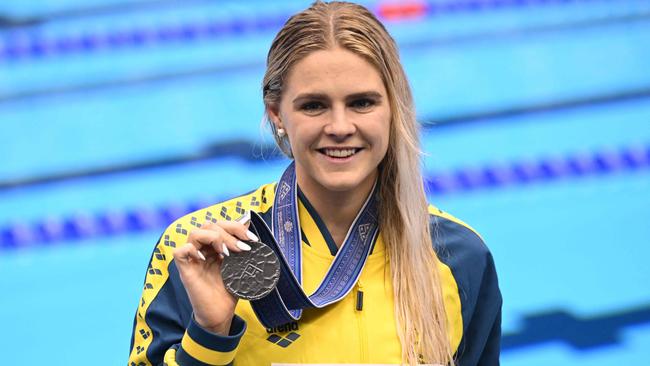
Jack, 24, has been one of the stars of the team in Fukuoka, helping the Dolphins break world records in three relays to get herself three golds.
Jack made her first world championship appearance in 2017 but her career was stalled when she tested positive to a banned stimulant before the 2019 world championships.
She succeeded in having her four-ban halved after the Court of Arbitration for Sport agreed she had not intentionally taken the banned stimulant but she still missed the Tokyo Olympics so is quickjoy making up for her lost time now.
Emma McKeon, the Olympic champion from Tokyo, missed the medals after finishing fifth.
9:55PM SHORT’S STANDING IN WORLD SWIMMING GROWS
Sam Short’s growing reputation as Australia’s next great long-distance swimmer is quickly coming to the boil.
On Sunday, he won a bronze medal in the men’s 1500m freestyle at the world championships in Japan, leapfrogging some of Australia’s all-time greats to move into second place overall in the nation rankings.
Racing against a stacked field, Sort showed enormous courage to get himself on the podium in a time of 14:37.28.
The only Australian to have gone quicker is Grant Hacket, who stopped the clock at 14:34.56 when he broke Kieren Perkins’ world record to win the 201 world title in the same Fukuoka pool.
Short moved ahead of Perkins and Mack Horton with his performance on Sunday.
He also joined Hackett as the only Australian to win medals over 400m, 80m and 1500m at the same world championships after he had earlier gold in the 400m and silver in the 800m.

Hackett last did the distance treble in 2005 and has tipped Short to break all his record.
His rival in the two shorter distances - Tunisia’s Ahmed Hafnaoui - won the 1500m in 14:34.54, just 0.05 ahead of American Olympic champion Bobby Fink, with both men threatening Sun Yang’s world record of 14:31.02 set at the 2012 London Olympics.
They can thank Short for getting so close after he led the field through the first 850m under world record pace before being overtaken.
Just 19, Paris can’t come soon enough for Short, where he is a real chance in three individual events, 100 years after Boy Charlton became the first Aussie to win the Olympic 1500m title, also in the French capital.
THE RUTHLESS GENIUS BEHIND AUSTRALIA’S SWIM SUCCESS
Australia’s best swimmers have never been good losers.
Trained to fight tooth and nail and win every race they go in, they just can’t disguise their true feelings when someone gets their hands on the wall before them.
When the cameras are rolling, they always smile politely and congratulate their victor, but secretly, they are boiling, because they just hate coming second.
That same mentality is also why they win so often.
At a time when a lot of other sports have been sucked into the woke notion that every kid deserves a prize, swimming’s ruthless obsession with winning has helped transform the Dolphins into one of Australia’s best international sporting teams.
Barring a dramatic last day turnaround at the world championships in Japan, the Australian squad will almost certainly finish on top of the medal standings as the No. 1 swimming nation in the world.

It’s a rare feat, achieved only once before at the world championship, when Ian Thorpe and Grant Hackett ruled the waves two decades ago.
Before then, you have to go all the way back to the 1956 Melbourne Olympics, when Dawn Fraser was in the green and gold togs.
The team’s new success can largely be attributed to one man’s vision and drive, though he’d be livid at the mention of it.
Dean Boxall, who has been described at times both as a genius and an eccentric, is the personal coach of 10 members of the team in Fukuoka.
If Boxall’s team of stars were their own country, they would be sitting perched on top of the medal standings so his success is Australia’s success.
His brightest star is teenage sensation Mollie O’Callaghan, who won the 100m and 200m freestyle finals – becoming the first woman to achieve the double at the world championships.
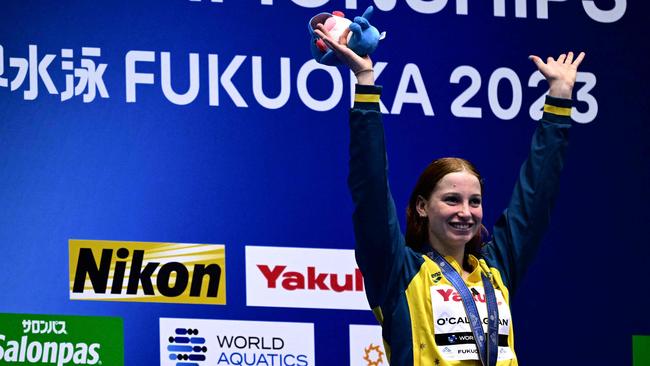
He also coaches Ariarne Titmus, who won the 400m freestyle gold and five other swimmers from his St Peter’s club in Brisbane have also won relay golds in Fukuoka this week – Shayna Jack, Brianna Throssell, Kiah Melverton, Jack Cartwright and Kai Taylor.
In the women’s 4x200m, each of the four Aussies who swam the final – and broke the world record – were trained by Boxall.
It’s a phenomenal strike rate but it comes with its own problems because for every winner, there has to be a loser.
There was no better illustration of this than in the women’s 200m freestyle final – the best race of the world championships.
O’Callaghan got the gold and all the glory that goes with it – including a $44,000 bonus for breaking the oldest world record in women’s swimming – but it came at the expense of her training partner.
Titmus, who had broken the 400m freestyle world record 48 hours earlier, finished a close second.
There was a touching moment at the medal ceremony when O’Callaghan invited Titmus to join her on the top step of the podium but there was no mistaking the Terminator’s frustration.

“To be honest,” Titmus said later, “I wanted to win that.”
That’s sweet music to the ears of everyone who still thinks ambition is a good trait to have.
One of the many reasons Australians admire Titmus so much is because she wears her heart on her sleeve, but the intense competition within his own squad places Boxall in an precarious position in the lead up to next year’s Paris Olympics.
When the world championships end on Sunday and they all fly back home to Queensland with new medals in their backpacks, they will dive straight back into training for Paris.
Almost every day for the next 12 months, they will go up against each other in training knowing only one of them can win the ultimate prize next year.
Throw in Shayna Jack – one of the favourites to win the 50m freestyle – and those training sessions would be box office gold, if the coach ever let anyone in to see,
It’s a tricky situation for Boxall though because he doesn’t play favourites and has to treat each of his swimmers differently.
Dean Boxall with his patented "I'm gonna rip this railing out of the ground" celebration pic.twitter.com/zDQEJMZEPZ
— Kyle Sockwell (@kylesockwell) July 23, 2023
“The best way to describe it is each athlete is a door and Dean has a bunch of keys and he finds the key to unlock each door,” Titmus said.
“Every lock is different. And I feel like he found my key very quickly and he finds everyone else’s key to work with them differently and to get the best out of them.
“I feel very passionate about thanking our coach. I personally, like most of us, have a very close relationship with him as my coach, as my friend, as a male figure in my life and I will just be forever grateful to him for this, this would not be possible without him and I think that is why I owe it to him, I get emotional talking about him (tears) … he means a lot to us.”
Titmus broke down in tears at the same time she was trying to explain her coach’s approach to training and managing his swimmers, but she was not alone in letting her emotions take over while talking about Boxall.
Jack, who credits Boxall for helping her get through the torment of serving a two-year ban for a doping office she maintains she was innocent of, also spoke about his positive impact on all the squad members.
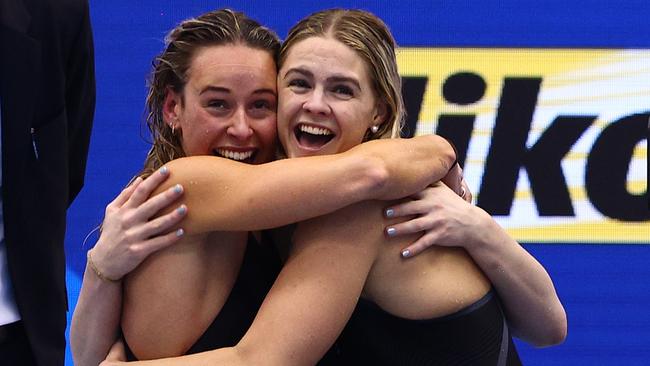
“He’s the person that gets us going every day and he’s the person that lifts us up,” Jack said.
“He is our family, he is someone that we aspire to make proud and I think we have done that.
“I wouldn’t be surprised if we all shed a little bit of a tear because we’re his girls and we’re there to represent him and the club.”
Aside from his wild celebrations at the Tokyo Olympics which went viral when Titmus won the 400m freestyle gold, the Australian public knows little about Boxall because he refuses to talk to the media, at least on the record.
But those that know him best say he’s a tactical genius who gets all the little one percenters right.
“It’s interesting,” Australia’s head coach Rohan Taylor said when asked how Boxall produces so many great swimmers.
“I’d say his attention to detail with everybody that he works with.
“He’s just very meticulous with the planning for the individual. So that’s the first part.
“He doesn’t just broad brush, he sits with you, gets to find out what motivates you. He does a lot of that work, and then he builds the training program and then he connects with you while you’re training around those goals and those vision.
“(Michael Bohl) does that very well too, so he’s able to do that and be able to keep you on track. And then when you’re off track to say, ‘Hey, you wanted to do this, We talked about these things. Here’s a training session, you’ve got to deliver it.’
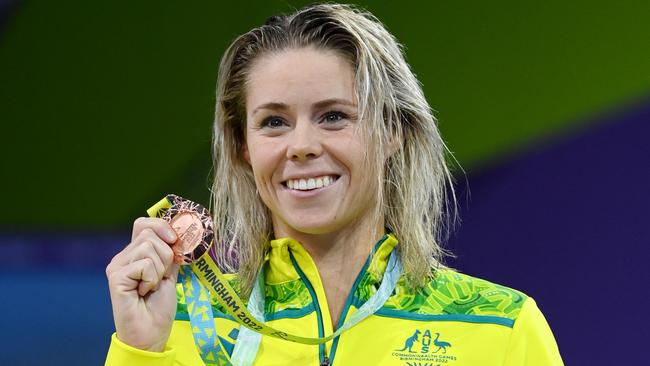
“He talks about it being a different key for each person. He’s very good at that. So the way he manages Arnie and the way he manages Mollie is very, very good. I think that’s a strength of his. But his attention to detail and the stuff he does to be knowledgeable around what it’s going to take.
“During the 200m, I was sitting with him and he said to me, if it’s 1:24.0 at the 150m, the world record is going.
“And sure enough. It was 1:24.0 and the record was broken so he knows what he’s looking at.
“All good coaches are very much like that, but that’s the uniqueness I see. He’s got so many athletes. It’s one thing to have one or two and you like that, but he’s across the board and he studies all the others, even the 4x200m watching the other teams like what they’ve done before and where they did it, he knows all that stuff.
“He just has very good knowledge and delivers really well to the individuals.”
It’s no coincidence that Boxall is often likened to Bohl, the grand master of Australia’s current coaches.
Bohl has trained some of Australia’s greatest ever swimmers, including Stephanie Rice and Emma McKeon, and is renowned for his detailed, personalised approach.
He’s also mentored some of the best coaches, including Boxall.
🇦🇺 Mollie O'Callaghan takes the lead in the last 20m!
— World Aquatics (@WorldAquatics) July 28, 2023
What a magic double at #AQUAFukuoka23
100-200m Free 🥇🥇@DolphinsAUSpic.twitter.com/RJxbhIn4xL
“I think there’s some similarities in their athlete management skills,” Taylor said.
“They care deeply about their athletes and they have that real understanding and do that.
“Bohly is very, very good at that and I think absolutely Dean would have seen that and that would be part of it. They’re really able to separate really quickly, like you’re here to train this business, but they really spend time talking to them.”
Boxall’s real hidden talent is his ability to devise specific tactics for his swimmers, and their opponents.
In the 400m freestyle, when Titmus broke the world record, she caught her great rivals Katie Ledecky and Canadian teenage starlet Summer McIntosh napping by going out hard from the start.
Normally a fast finisher, Titmus led all the way from the front and it was game over from the moment she dived in.
O’Callaghan’s approach is the opposite.
She comes flying from behind, reeling off lightning fast closing laps that no one in women’s swimming can match.
Her best work is often unseen, taking place under the water when she kicks off the turns, gaining precious metres off her rivals who already surfaced.
Loyal to a tee, she says she can’t ever give away her coach’s secrets but everyone already knows her underwater skills and closing speed are the envy of every other female swimmer in the world.

“It’s a learned thing,” she said. “It’s not so much confidence.
“You have got to learn to do that skill, you can’t just swim it out of nowhere.
“Just maintaining my race plan and doing what is best for me, I have got to learn new things and try new things out.”
Naturally shy and always nervous, O’Callaghan has done a great job so far flying under the radar, but her cover has been blown.
She often talks about how she just races for fun and is surprised every time she wins but deep down the 19-year-old is as wise and switched on as all of Boxall’s swimmers – fiercely determined and working hard on all the little things she wants to improve to get even better.
“You can’t always be confident in the back end because you don’t know how the other girls train or how they race,” she said.
“I have never really raced the majority of them before so you can’t have too much confidence, you have got to trust yourself.
“There’s lots of things. It’s not just one thing I can do better, there is much more I can do better and with the assistance of Dean I think I can grow so much as an athlete and individual.”
Of course, the biggest mistake that anyone in swimming can make is to count medals before the races take place, but all the signs indicate the current Dolphins are on their way to being the best Australian swim team ever – with expectations they will carve it up in Paris next year.

The Dolphins won a record nine gold medals at the 2021 Tokyo Olympics but look even stronger heading into 2024.
And it’s not just Boxall’s swimmers that Australians will want to keep their eyes on.
Kaylee McKeown, trained by Bohl, is already a bona fide superstar and almost unbeatable in the women’s backstroke races.
Kyle Chalmers, the best relay swimmer on the planet, has just won his first individual 100m freestyle crown and has every reason to believe he can add another Olympic gold to the won he pocketed in Rio in 2016 when he was still in high school.
And then there’s Sam Short, the best long distance swimmer Australia has produced in decades.
Just a teenager, he looks and sounds like any kid in Australia who spends his weekend at the beach, but there’s a difference.
Like everyone else in the team, he also hates to lose, and that makes him a winner.





